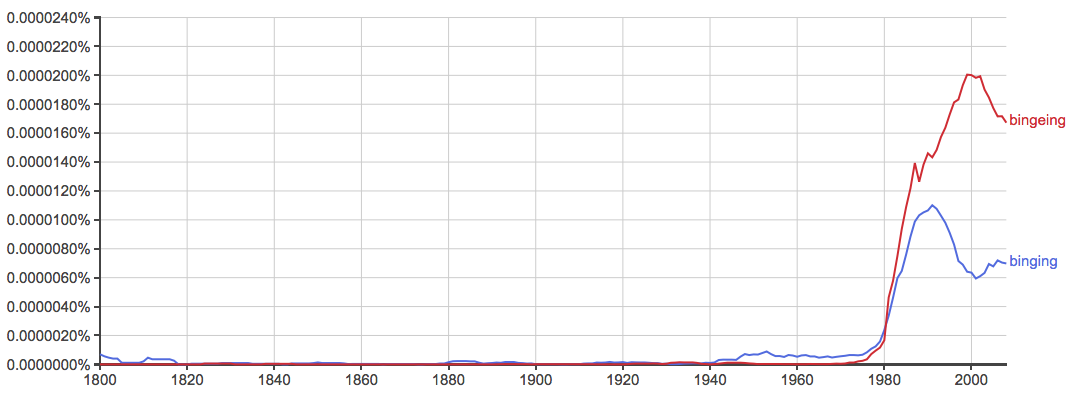As awareness of eating disorders has increased since the 1980s, so has use of the verb binge.
As with many verbs, conjugating binge into various tenses can be challenging. Should the E remain in the progressive tense, to form bingeing, or should it be removed, forming binging?
Continue reading for the answer.
What is the Difference Between Bingeing and Binging?
In this article, I will compare bingeing vs. binging. I will use each of these spellings in at least one example sentence, so you can see them in context.
Plus, I will show you a way to use a memory tool so that you will know whether to use bingeing or binging.
When to Use Bingeing
 What does bingeing mean? Bingeing is the progressive tense of the verb binge, which means to partake in something to excess.
What does bingeing mean? Bingeing is the progressive tense of the verb binge, which means to partake in something to excess.
Here are some examples,
- My boss doesn’t get any work done because he is in his office bingeing on Stranger Things on Netflix.
- We celebrated the end of Lent by bingeing on cheeseburgers and fries at the burger joint down the street.
- “Mary couldn’t make it to class today because she is bingeing on alcohol,” said John.
- Bingeing on a book series is the perfect activity for December — it makes for a great escape from the crush of social obligations, and when the weather turns cold, it is an ideal indoor diversion. –The Washington Post
Of the two spellings, bingeing is several times more common than binging.
When to Use Binging
 What does binging mean? Binging is an alternative spelling of the same word with the same meanings.
What does binging mean? Binging is an alternative spelling of the same word with the same meanings.
I have included a few examples below,
- Repeated binging and purging is bad for your health in a number of ways.
- I will no longer be binging on popcorn every time I go to the movie theater.
- Binging on candy every year on Halloween is a time-honored American tradition.
If you are a Microsoft employee and you are within earshot of your supervisor, you might use binging as a substitute for the verb googling to signal that you are using Microsoft’s search engine Bing instead of its competitor, Google Search.
All jokes aside, perhaps this is why bingeing has taken such a clear lead in usage: because of the possible confusion between bing-ing, like the sound bing, and binge-ing. By retaining the “E,” it is impossible to make that confusion.
Here is a graph of the usage of binging vs. bingeing over time.

As you can see, the words were virtually neck-and-neck until about 1980, when bingeing took a clear lead. This chart isn’t scientific, since it only looks at books printed in English since 1800. Still, we can see that there is a clear trend in favor of bingeing in contemporary English.
Trick to Remember the Difference
Formal English has not standardized around either of these spellings. You are probably safe using whichever one looks correct to you. Since bingeing is used much more frequently, best practice would be to default to it, since it will probably look more familiar to your readers.
As mentioned above, the extra “E” does seem to add a bit of clarification that is worthwhile.
Since the word bingeing contains the letter E, like the word excess, so you can use your knowledge of the word’s meaning to remember that bingeing is probably a better option.
Summary
Is it bingeing or binging? Bingeing and binging are two alternative spellings of the progressive tense of the word binge, which means to partake to excess.
Formal English does not have a clear standard for either version, but in actual usage, bingeing is much more common. Since bingeing shares an E with excess, you can easily remember to choose it unless you have a good reason to use binging instead.
Alternatively, you can always check this article for a quick refresher to determine whether binging or bingeing is the correct word choice for your sentence.
Contents
